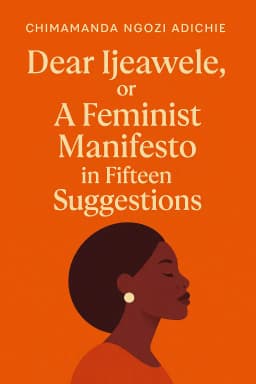
Your Sanity is Not Debatable
Golden Hook & Introduction
SECTION
Michael: Okay, Kevin. On Gaslighting. Five-word review. Go. Kevin: It's not you, it's them. Michael: Nice. Mine is: 'Your sanity is not debatable.' Kevin: Ooh, I like that. That hits harder. It already feels like this isn't just about telling lies. Michael: Exactly. And that's what we're diving into today with Kate Abramson's book, On Gaslighting. What's fascinating is that Abramson is a serious philosophy professor, specializing in thinkers from the 1700s. She was inspired to write this because she saw how naming a harm, like 'sexual harassment,' empowers people. She wanted to give 'gaslighting' that same philosophical weight. Kevin: So she's taking a term we all throw around and putting it under a philosophical microscope. I'm in. The book has been getting a lot of buzz, praised for its rigor, though some readers find it pretty academic and dense. It seems like she’s trying to build a really solid foundation for a word that’s become a bit of a buzzword. Michael: That's the perfect way to put it. She wants to rescue the term from what she calls 'semantic bleaching'—where it gets so overused it loses its meaning. Kevin: Okay, so where do we even start? The word is everywhere now. What's the real, original-flavor definition of gaslighting?
Deconstructing the Buzzword: What Gaslighting Truly Is
SECTION
Michael: The perfect place to start is where the term itself came from: the 1944 film, Gaslight. It’s a fantastic, almost perfect caricature of the phenomenon. In the movie, a husband named Gregory is trying to drive his wife, Paula, insane. Kevin: Why? What’s the motive? Michael: He wants to steal her dead aunt's hidden jewels, which are in the attic of their house. To search for them without her noticing, he needs to create a distraction. And his distraction is her own sanity. Kevin: That is next-level evil. So how does he do it? Michael: It's a systematic campaign. The most famous example is that he turns on the gaslights in the attic to search for the jewels, which causes the other gaslights in the house to dim. When Paula notices and asks, "Are the lights dimming?" he tells her she's imagining it. He does this over and over. Kevin: Wow. So he's literally messing with her perception of light. Michael: Exactly. But it's more than that. He hides a brooch he gave her, then accuses her of losing it. He isolates her from friends, telling them she's unwell. He creates this bubble of reality where everything she perceives is wrong, and he is the only one who knows the truth. She becomes completely dependent on his version of events. Kevin: Right, I've heard of the movie, but I never realized how methodical it was. Okay, but here’s the big question for me: how is that different from just being a manipulative liar? I think a lot of people, myself included, have been in relationships with people who lie to cover their tracks. Is that gaslighting? Michael: That's the crucial distinction Abramson makes. She has this great line: "Gaslighting in this sense—the sense so aptly captured by the movie—is different from lying, dismissing or ignoring someone." A lie is meant to deceive you about a fact. Gaslighting is meant to make you doubt your ability to perceive any facts at all. Kevin: Let me see if I got that right. A liar wants you to believe a falsehood. A gaslighter wants you to believe you're incapable of knowing what's true. Michael: Precisely. The aim isn't just to win an argument or hide an affair. The aim is to destroy the other person's standing as a rational agent. To make them, and everyone else, think they're "crazy" and that their perceptions can't be trusted. It’s an attack on the very foundation of their mind. Kevin: That is a terrifying goal. It feels like you'd have to be a complete supervillain to even attempt that. How does a normal person, not a jewel thief from a black-and-white movie, actually pull this off?
The Gaslighter's Toolbox: Weaponizing Our Humanity
SECTION
Michael: Well, this is where Abramson's analysis gets really insightful, and frankly, a bit chilling. She opens up what she calls the "Gaslighter's Toolbox," and the most surprising thing is what's inside. It's not what you'd expect. Kevin: What do you mean? Like, not lies and deception? Michael: Oh, those are in there, but they're not the primary tools. The most powerful tools a gaslighter uses are actually the target's own virtues. They weaponize your humanity against you. Kevin: Hold on. They weaponize your strengths? How does that work? Michael: Let's take two examples. First, they weaponize love and trust. Abramson tells the story of Pat, a talented golfer, and her fiancé, Collier. Collier doesn't want Pat to have a career; he wants a traditional wife. But he doesn't just say that. Kevin: Of course not. That would be too honest. Michael: Instead, he frames his manipulation as concern. He expresses "worries" about her game, shakes his head with a look of "concern" during her championship match, which causes her to lose confidence and flub her shots. He's not just lying; he's using her love and trust in him—her belief that he has her best interests at heart—to make her doubt her own abilities. Kevin: So he's using the language of love to undermine her. That's just… insidious. Michael: It is. And it works because in a loving relationship, you're supposed to take your partner's concerns seriously. He's hijacking that normal, healthy dynamic. The second tool is even more shocking: they weaponize empathy. Kevin: Wait, they use your own empathy against you? That's diabolical. Michael: Abramson gives this stunningly clear example from a workplace. A junior academic woman is slapped on the butt by a male colleague. It's a clear case of harassment. She reports it to a senior colleague, looking for support. Kevin: And what does the senior colleague say? Michael: He says, "Oh, he’s just an old guy. Have some sympathy. It’s not that big a deal." He tells another colleague, who says, "Don't be so sensitive." Kevin: Whoa. So instead of validating her experience, they're telling her to feel sorry for the guy who harassed her. Michael: Exactly. They are demanding empathy for the perpetrator. They're using her capacity for empathy as a tool to dismiss her reality and make her feel like her own reaction is the problem. She's the one being "too sensitive," not him being inappropriate. Kevin: So it's like they're hijacking the best parts of you—your ability to trust, to love, to feel for others—and using them as levers to control your reality. And it's especially powerful because society often tells certain groups, especially women, that they should be more empathetic and less confrontational. Michael: You've nailed it. Abramson connects this directly to social power structures. Prejudicial tropes—like women being "hysterical" or "oversensitive"—become powerful tools in the gaslighter's kit. They don't have to invent the script; society has already written it for them. Kevin: This is so much darker than I thought. It's not just about manipulation, it feels... soul-crushing.
The Moral Horror Show: Why Gaslighting is a Soul-Level Attack
SECTION
Michael: It is. And that's the final piece of the puzzle Abramson puts together. She argues that we can't understand what's wrong with gaslighting without seeing it as a "multidimensional moral horror show." It's not just one thing that's wrong with it; it's everything. Kevin: What does she mean by a 'moral horror show'? That sounds intense. Michael: She introduces this concept of "blameless complicity." It's a really powerful idea. She draws a parallel to the experience of torture. A philosopher named David Sussman argues that the unique horror of torture isn't just the pain; it's that the torturer uses your own body and will against you, forcing you to collude in your own violation. Kevin: Wow. 'Blameless complicity.' That's a heavy phrase. So you're not just a victim, you're turned into the instrument of your own destruction? Michael: Precisely. In gaslighting, the manipulator uses your own mind—your own reflective processes, your love, your empathy, your desire to be a reasonable person—to tear you down. You become an active, though blameless, participant in your own undoing. You start to police your own thoughts, dismiss your own feelings, and question your own sanity because the gaslighter has turned your own mind into a weapon against you. Kevin: That explains why the damage is so deep. It's an inside job, orchestrated from the outside. Michael: It is. And it leads to what Abramson calls "existential silencing." The goal isn't just to make you quiet; it's to destroy the very standpoint from which you could speak. This is why the experience is so devastating. It's captured perfectly in a quote from the philosopher Simone de Beauvoir after a long, grueling intellectual takedown by her partner, Jean-Paul Sartre. She wrote, "I’m no longer sure what I think, or even if I think at all." Kevin: "Or even if I think at all." That's the end goal, isn't it? To erase the person. That’s horrifying. It's no wonder the book has been so well-received by critics for its philosophical depth. It’s connecting a common experience to these profound moral and existential stakes. Michael: It is. And it explains why a common outcome of successful gaslighting is severe clinical depression. Abramson reframes this depression not as a sign of weakness, but as a form of "existential grief." It's a fitting, rational response to the loss of your self, your ability to trust your own mind.
Synthesis & Takeaways
SECTION
Kevin: So what's the one thing we should take away from this? If it's so hard to spot and so insidious, what's the defense? Michael: I think Abramson's whole project points to the answer. The true danger of gaslighting is that it targets our fundamental ability to know and to trust ourselves. It's an attack on our standing as a person. So the defense has to start there. It starts with naming the harm. Kevin: Like her original inspiration for the book. Michael: Exactly. Just having the concept, a clear one, is a shield. It allows you to say, "What is happening to me is a known phenomenon. It has a name." And from there, you can hold onto the core truth that this book champions: your sanity is not up for debate. Your perception of reality is valid. Kevin: So the first step is just refusing to enter the debate. Michael: Yes. And to recognize, as Abramson says, that "Suffering on account of it is not a sign of fragility, weakness, or an exceptionally damaged psyche; it’s a sign of being human." We all need our reality confirmed by others. Gaslighting works by systematically denying that confirmation. The defense is to find it elsewhere and to trust yourself first. Kevin: That's a powerful thought. It makes you wonder how often we dismiss our own gut feelings because someone else tells us we're 'overreacting' or 'being too sensitive.' It's a good challenge for all of us. What's one moment you trusted your gut even when someone else questioned it? We'd love to hear your stories and thoughts on this. Join the conversation with the Aibrary community. Michael: A great question to end on. It all comes back to that internal compass. Kevin: This is Aibrary, signing off.









